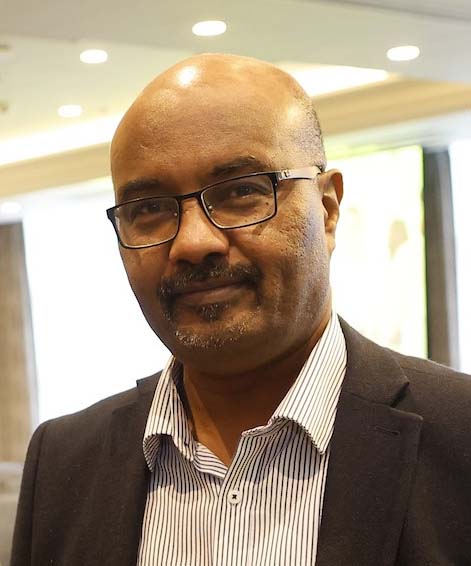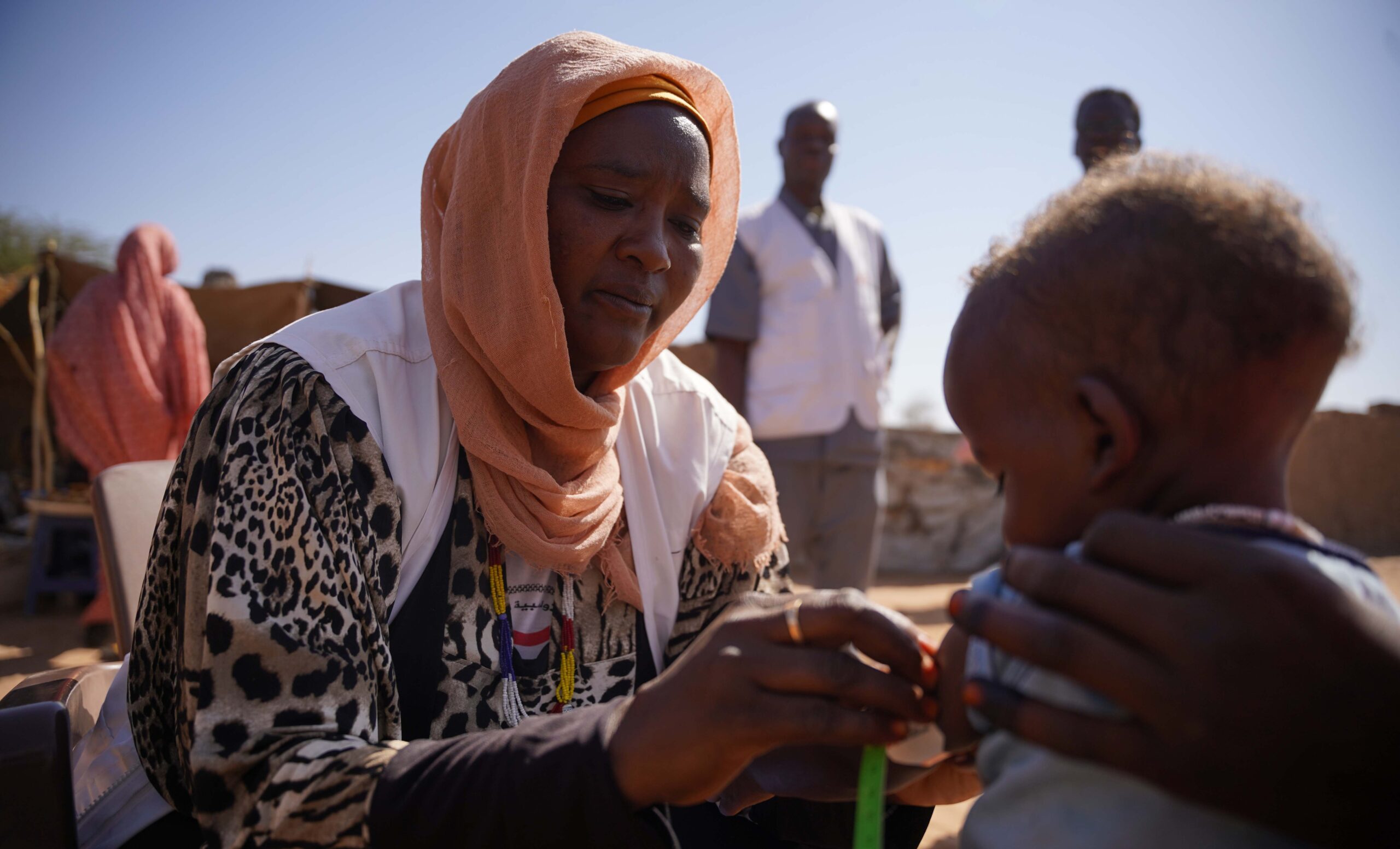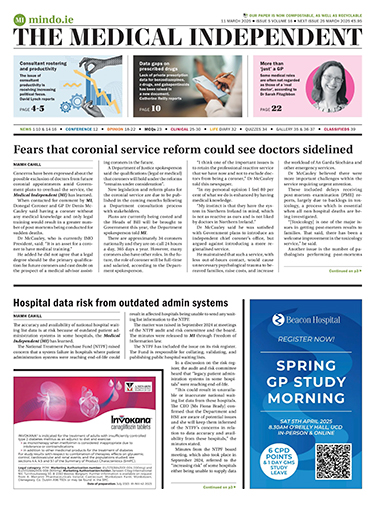Catherine Reilly speaks to Sudanese doctors based in Ireland about the catastrophic conflict in their country
“This is the worst humanitarian displacement in recent history,” says Dublin orthopaedic surgeon Mr Yassir Hamad, reflecting on the devastating impact of the war in his native Sudan.
“But it is like a forgotten war,” he tells the Medical Independent (MI).

Mr Yassir Hamad
The conflict erupted in April 2023 – a power struggle between the Sudanese Armed Forces (SAF) and the main paramilitary force, Rapid Support Forces (RSF). The violence perpetrated by both parties has wreaked havoc on life in Sudan, which has a population of over 45 million people.
On 20 March, the UN Security Council was warned the conflict was driving a food insecurity emergency.
“…. Sudan is on course to become the world’s worst hunger crisis,” according to the briefing from the Office for the Coordination of Humanitarian Affairs. “Already, 18 million people – more than one-third of the country’s population – are facing acute food insecurity. By the time the lean season arrives in May, people in some parts of Darfur could face what we term IPC Phase 5 level acute food insecurity. We call this stage catastrophe.”
Speaking to MI on 13 March, Mr Hamad provided a sobering overview of the war’s impact quoting from reliable information sources.
At that point over 14,000 people had reportedly been killed, which he said was considered an under estimation. Over 8 million people were displaced (more than 6 million people internally), and 25 million people were in need of urgent humanitarian assistance and support, including over 14 million children. These disturbing statistics are rising daily.
Many hospitals are no longer functioning and at least 43 healthcare professionals had been killed.
Expatriate communities are living in constant fear for families and friends. “Regarding the phone network and phone connectivity, I know people who weren’t able to contact their families and I know people who only knew about their relatives’ – including mums and dads’ – deaths after three days,” said Mr Hamad, Consultant Orthopaedic Surgeon at Connolly Hospital, Blanchardstown.
“And the story goes on and on,” he said. “As the war continues, displacement continues, atrocities continue, breaches of human rights continue, and more tragedies. It is absolutely a forgotten war by the world in general.”
When MI spoke to Mr Hamad, he had just returned from assisting displaced family members in Egypt with their humanitarian and health needs.
Tragically, his cousin’s young son was killed in a bus crash after fleeing Sudan. His cousin and her daughter were injured.
“They were getting from Sudan to Egypt for safety and just ended up in a very heartbreaking story,” he said sadly.
“Those are people who got displaced internally for eight months, and then the war spread to their areas, and then they were forced to leave even that area, because of fear of being killed, and girls being raped and kidnapped. They were well-off in Sudan before war, had no problems at all, and would never think of getting out of Sudan….
(continued below panel)
The response of Irish Government departments
The Department of Foreign Affairs (DFA) said it assisted more than 360 Irish citizens and their dependents to leave Sudan following the onset of the war.
“Many citizens and dependents were assisted to depart Sudan in cooperation with international partners, including, but not limited to, other EU Member States. We continue to provide consular assistance to Irish citizens and dependents in Sudan through the Irish Embassy in Kenya.”
An unspecified “number” of Sudanese citizens who had been working in Ireland, or due to travel here, were in Sudan when the war erupted, according to the spokesperson.
“The Embassy in Nairobi provided appropriate advice on their status and entitlements, guided by the Department of Justice which is responsible for visa matters. This included a cohort of individuals with visas or work permits for Ireland, including medical doctors due to take up or return to positions in the Irish health service.”
On a diplomatic level, Ireland has “consistently emphasised the need for humanitarian access, a cessation of hostilities, and a clear role for civil society in Sudan’s political future”, the spokesperson added. “New EU sanctions were agreed in October 2023, in particular targeting those who attack civilians and obstruct humanitarian aid.” The DFA will continue to monitor developments and work with European and international partners “to promote a resolution of this crisis”.
The spokesperson said Irish Aid’s direct humanitarian response to the crisis amounted to €9.4 million in 2023.
Family reunification
Strict parameters surround the granting of family reunification in Ireland, which is managed by the Department of Justice. However, the Government has previously initiated enhanced access following global crises, such as the “Afghan Admission Programme” when the Taliban reclaimed power in 2021.
Under this programme a person from Afghanistan legally resident in Ireland could apply for up to four family members – who lived in Afghanistan or fled to neighbouring countries – to join them. There were up to 500 places available.
The Department’s default position on family reunification with elderly dependent parents, for example, is refusal. It also has high income criteria for the sponsors of such visas – which would particularly impact NCHD sponsors.
A Department of Justice spokesperson said: “While a specific programme in respect of Sudan does not exist, all existing immigration arrangements and programmes are open to the persons affected by the conflict.”
In 2022, 257 long-stay ‘join family’ visas were granted to Sudanese nationals compared with 297 between 1 April 2023 and 5 March 2024 (315 applications were received in 2022 and 364 applications from 1 April 2023 to 5 March 2024. An application processed during these periods may have been received outside of these timeframes).
Meanwhile, the Medical Council stated it had advocated to Irish authorities to assist Ireland-based Sudanese doctors and their families to evacuate Sudan following the outbreak of the war.
The Council said it is continuing to engage with the Sudanese Doctors Union of Ireland on a number of matters, including registration queues.
The HSE had not issued a response by press time.
“This is not only me. So many doctors are facing the same thing. Family members have got to other countries and have chronic sickness, very severe illnesses, and accidents.”
Sudanese doctors without an Irish passport may not have access to some countries. In the case of Egypt, for example, visa applications for doctors to travel and see their families are being refused.
Mr Hamad, who is President of the Sudanese Doctors Union of Ireland (SDUI), appealed to the government of Egypt to resolve this issue. He also appealed to the UN, UNHCR and the international community to step up to their responsibilities and provide protection to Sudanese people, including at the borders with neighbouring countries.
Doctors in Ireland
There are longstanding medical links between Ireland and Sudan – and today the Irish health service has a considerable dependency on Sudanese doctors.
Doctors who obtained their medical degree in Sudan are the second highest group of international doctors in Irish healthcare.

Dr Ahmed Humaida
According to Medical Council workforce data, 1,060 such doctors were clinically active in Ireland in 2023.
But tailored supports for the doctors have been lacking, and in many instances, non-existent. There is insufficient psychological and wellbeing support, huge obstacles to family reunification, and lengthy delays with Medical Council registration.
On 1 November, Mr Hamad publicly expressed disappointment in Irish authorities for failing to respond to the wellbeing needs of Sudanese doctors. He was speaking from the audience at a Medical Council event in Dublin following a session on doctor health.
‘Immense fear’
Dr Ahmed Humaida is a core specialist trainee in emergency medicine currently based at Cork University Hospital. He is membership secretary of the SDUI.
Dr Humaida commended his supervisor and colleagues for checking on his wellbeing and offering their support. However, he said this may not be the experience for many other doctors. He urged the health system to offer supports such as psychological assistance and additional leave where required.
He called for greater access to family reunification and reiterated Mr Hamad’s appeal for the Egyptian authorities to grant visas to doctors so they can visit displaced family members.
Working in Ireland for over five years, Dr Humaida is originally from Khartoum Bahri/North Khartoum.
After the onset of the war, Dr Humaida’s immediate family were trapped in North Khartoum amid the “air strikes and militia everywhere”. Militias from the RSF called to the house “many times”, stated Dr Humaida, and his family were forced to leave.
They stayed in Port Sudan for a number of months, and Dr Humaida travelled there to help them depart for Oman.
Dr Humaida said fulfilling work commitments while being exposed to distressing news about the war is an enormous struggle for Sudanese doctors.
“The constant overflow of bad news every day – or sometimes the lack of it, when the internet has been shut down by the war generals – we face immense fear for loved ones in Sudan. Even if you help your immediate family to escape Khartoum or escape the war zones, you still have [wider] family members in the war zones and dangerous areas.”
The doctors are also trying to meet the additional financial strain of assisting family members who are displaced.
Approximately two-thirds of Sudanese doctors in Ireland are considered the only breadwinner for their families in Sudan or displaced elsewhere.
Dr Humaida added that Sudanese and Sudanese-Irish medics in Ireland, as part of the wider diaspora in the US, UK, and the Gulf region, have responded to the conflict in a collaborative and decisive manner.
“Their humanitarian response and contributions have been instrumental in providing assistance and relief to civilians across Sudan, in addition to ensuring support for the crucial work of civil society to save lives and minimise suffering, while also advocating for international attention to be placed on the worsening humanitarian situation in Sudan.”
He said the conflict in Sudan is incredibly destructive and shares the same level of suffering and despair as other wars around the world. “However, there is a severe lack of information due to a media blackout and limited coverage both in traditional media and online platforms…. The death toll is alarming, with instances of genocide occurring, and there is a looming threat of famine that is impacting millions of displaced families.”
20-to-30 per cent of health facilities remain functional
Ms Claire Nicolet, Head of Médecins Sans Frontières/Doctors Without Borders (MSF) Emergency Response in Sudan, spoke to the Medical Independent (MI) on 25 March about the impact of the crisis
MI: Could you describe the nature and scale of the humanitarian impact on the people of Sudan since the eruption of the conflict, and is the humanitarian situation continuing to deteriorate?
Across the country, the situation is continuing to deteriorate. After nearly a year of fighting, there is no end to the conflict in sight. 25 million people are now in need of humanitarian assistance – almost a 40 per cent increase compared to the previous year. More than 6.5 million people have become displaced within Sudan, and over 1.7 million have become refugees in neighbouring countries.
Airstrikes, drone strikes and heavy weapons, including tanks, have destroyed markets, infrastructure, crucial buildings – including healthcare facilities – and residential neighbourhoods. Street battles have raged through suburbs and villages, while some reports suggest that snipers have shot people leaving their houses to fetch food and water.
The unrelenting violence in Sudan has led to catastrophic injuries, and our teams regularly treat severely injured patients, including women and children.
The UN recently estimated that 13,900 people have been killed since the war began, but this is likely an underestimate. In Darfur, it is estimated that at least 10,000 people were deliberately killed in ethnically targeted violence.
MI: What is the extent of healthcare provision in Sudan and neighbouring countries for those displaced. What is the level of access to healthcare and essential medicines for people with acute injuries, and existing long-term conditions, both in Sudan and neighbouring countries?
There are extreme levels of suffering across Sudan, either as a direct or an indirect consequence of the war. The Sudanese health system was fragile even before the conflict started – now it is under even more pressure.
It is estimated that only 20-to-30 per cent of health facilities remain functional in Sudan, meaning that it is extremely difficult for people to access healthcare. Essential supplies and equipment are lacking, and many hospitals have closed completely. The availability of healthcare staff has also been severely disrupted by the ongoing conflict due to Ministry of Health staff salaries not being paid for many months.
MSF works in health structures across 12 of Sudan’s states, and patients often reach us in a critical condition either due to the violence, distance to health facilities, or the cost of transportation. The cost and availability of medicine has also [been drastically impacted] meaning that those with chronic diseases are unable to manage their condition – we often receive patients in a diabetic coma who have run out of insulin, for example.
Various parts of Sudan have seen large-scale outbreaks of vaccine-preventable diseases like measles, cholera cases have surged, and children in some parts of the country are experiencing devastating levels of malnutrition. In the city of El Fasher and in Zamzam camp in North Darfur, vaccines ran out in February, and in South Darfur the last remaining doses of pentavalent, polio, and measles vaccines available in the entire state were administered at the start of March. These vaccines are provided to the MoH by the UN, but the Sudanese authorities have prevented the UN from bringing supplies into, or through, RSF-controlled areas for months. One of the results of this is that children are now exposed to serious illnesses and complications that are totally preventable, so there is now a huge risk of disease outbreaks. In El Fasher, there have been four suspected cases of measles this month.
More than half a million people have fled to Chad since the start of the conflict. In June 2023, more than 850 war-wounded Sudanese, mainly with bullet wounds, were received in the MSF-supported hospital in Adré in the space of just three days. Hundreds of thousands of people previously trapped in West Darfur joined them en masse from June onwards. We heard horrific stories of violence, including sexual violence, from survivors.
After the first episode of violence, we also did a retrospective mortality study in refugee camps, asking families who among them died and when (before or after the beginning of the crisis), and of which cause. The refugees who came from West Darfur’s capital El Geneina were particularly affected, with a mortality rate 20 times higher compared to before the conflict began. 83 per cent of those deaths were men, consistent with accounts of systematic targeting of the men. And 82 per cent of the deaths were caused by violence, mostly gun violence.
In the camps in eastern Chad there is currently an outbreak of hepatitis E, which is being exacerbated by poor sanitation and a desperate shortage of clean water in the camps. In Adré camp, there is just one latrine for 677 people, while in Metché camp there is one latrine for 225 people. Without swift action to improve sanitation infrastructure and enhance people’s access to clean water, there is a risk that we will witness a surge in preventable diseases and unnecessary loss of life.
MSF is currently providing more than 70 per cent of the drinking water available in Adré, Aboutengue, Metché and Al-Acha camps. Despite this, people are receiving just 11 litres of clean water per day – well below the 20 litres per person per day recommended for emergency settings. Despite our relentless efforts, the humanitarian response in eastern Chad has been hampered by insufficient funding for humanitarian organisations on the ground, leaving critical gaps in the provision of food, water and sanitation.
Over half a million people have also fled to South Sudan, where a humanitarian crisis is escalating in Bulukat and Renk, two of the busiest transit sites in Upper Nile state. Many have no clear destination and spend weeks or even months in and around the transit centres, struggling to survive with a scarcity of humanitarian aid.
Renk has two transit sites, both of which are dangerously overcrowded, with almost 30,000 people living in an area meant to host no more than 12,000 people. The transit site at Bulukat is smaller – it has consistently hosted around 5,000 people at any given time since last July – but people’s living conditions are also harsh. Many families fled their homes with few or no belongings, and are now vulnerable to hunger, malnutrition and disease, exacerbated by inadequate shelter and the lack of clean water and sanitation facilities.
In both locations, MSF has launched mobile clinics to provide primary healthcare to returnees, refugees and host communities. Treating around 150 patients every day, the mobile clinic in Bulukat alone has provided over 28,000 outpatient consultations.
MI: What are the key challenges for organisations such as MSF in providing healthcare and humanitarian support for people in Sudan and those displaced in neighbouring countries; to what extent are the ‘actors’ in this conflict preventing the timely provision of these supports?
One of the biggest current challenges is the blockade that has been imposed by the Sudanese authorities on bringing supplies from Port Sudan – where the cargo ships arrive – to RSF-controlled areas. This impacts on many of our facilities – including our hospitals in Khartoum – and therefore our ability to provide healthcare. It also impacts on the UN and other humanitarian organisations, as is the case with the lack of vaccines – especially in Darfur. We don’t foresee that the government will change its policy anytime soon and we are therefore in the process of trying to build a supply corridor from Chad.
There are also high levels of insecurity across Sudan. For many months we were unable to access areas where we had previously had a presence for many years. The looting of health facilities and attacks on health premises and health personnel have, unfortunately, became a hallmark of the conflict. Multiple incidents have taken place in all types of facilities – including those where MSF works. The WHO has documented 62 attacks on healthcare in Sudan since the conflict began in April 2023. So on a regular basis, our ability to deliver healthcare is hindered by violent incidents like this.
MI: MSF has drawn specific attention to the alarmingly high levels of malnutrition to Zamzam camp in North Darfur. What is the situation currently?
Due to the massive malnutrition and mortality crisis that we found when we carried out our rapid nutrition and mortality assessment in January, we are scaling-up our response in Zamzam camp. We are about to begin a mass screening of 100,000 people – children under-five as well as pregnant and breastfeeding women – to try and reach those in most urgent need of support. We will also soon be opening a 50-bed field hospital, where the most-critical cases will be admitted, while those who can be treated on an outpatient basis will receive therapeutic food.
We will also open a second outpatient clinic to try and meet some of the huge health needs in the camp, but it will not be enough to address the scale of the disaster. In North Darfur, there is a critical shortage of everything. There are an estimated 2.8 million people living in the state, and there are nowhere near enough health providers operating there to meet the needs of the population. Our small clinic in Zamzam remains the sole provider of healthcare in the camp, which is home to around 300,000 people – and one of the few for the entire 2.8 million people who live in the state.
Our clinic sees over 200 patients a day – many of whom arrive on foot or by donkey from up to 50km away. Our team is overwhelmed by the vast and growing needs. Over the past few months, thousands of people have been arriving in Zamzam from other parts of Darfur in search of safety. They are sheltering in schools with no food and no access to clean water. In such overcrowded and unsanitary conditions, disease outbreaks are inevitable – and, since there are few vaccines in North Darfur, we expect the already drastic mortality rates that we found to increase even further.
In terms of malnutrition, all the clinics where children could previously be taken to receive treatment in the state capital, El Fasher, have been closed for months. This means that we receive very critical cases at the paediatric hospital we support in the city – many of the children need to be admitted to the ICU because their condition is so serious.
Over the past few months, although we have been able to bring in supplies for our facilities in North Darfur from Chad, we remain almost completely alone there. The UN have a very limited presence in El Fasher, as most of their teams were evacuated after the war began. The same goes for other international NGOs, who have not yet returned. The needs of the population are vast and we cannot meet them alone. It is vital and urgent that more organisations come to North Darfur to scale-up the response alongside us.
We anticipate that the situation will deteriorate even further without an immediate scale-up in the humanitarian response. There have been no food distributions from WFP that we are aware of since May last year. People in the camp were almost entirely reliant on these for their survival. January, when we conducted our assessment, is a time when malnutrition should have been at its lowest, because December is when the harvest usually takes place meaning that stocks of food should be at their highest. But over the past year people have been unable to tend to their crops due to the insecurity, and on top of this, what little agricultural production that has been possible has been below average because of low rainfall. With the usual malnutrition peak just around the corner – between April and September – we are expecting the already enormous number of cases we are seeing now to drastically increase over the coming months.
To provide food rations for 500,000 people in both Zamzam and the state capital, El Fasher, we have calculated that 370 trucks each delivering 20 tons of food will be needed every month. As well as this, there is an urgent need for hospitals, water, sanitation – and access.
MI: What can countries such as Ireland do to support people in Sudan and help bring an end to this conflict. What are the key actions MSF is seeking from the international community to support people in Sudan and to help end the conflict?
What is needed are guarantees from all parties to the conflict to ensure unhindered access for humanitarian organisations so that the humanitarian response across the country can be scaled-up. Alongside this, it is also vital that they ensure the protection of both humanitarian personnel and the civilian population. The blockade on supplies also needs to be lifted as a matter of urgency.
At present, we bring supplies in from Chad, but this is a long journey that used to be possible by air. There was a recent announcement from the UN that three airports would be opened – including one in North Darfur. This would make a massive difference to the humanitarian response. It would enable a huge and rapid scale-up in North Darfur. The UN have also announced that they have trucks destined for West, Central and South Darfur, where the needs are also huge – but there is no guarantee that they will reach their destinations. UN convoys destined for various locations have been stuck in eastern Sudan for months, unable to move due to the lack of travel permits and insecurity on the roads. The Jeddah talks and other peace negotiations have failed and people are suffering as a result. The international community needs to turn its attention towards securing sustained access for humanitarian organisations and protection for civilians and humanitarian workers. Increased funding for the humanitarian response across Sudan and in neighbouring countries is also vital.













Leave a Reply
You must be logged in to post a comment.